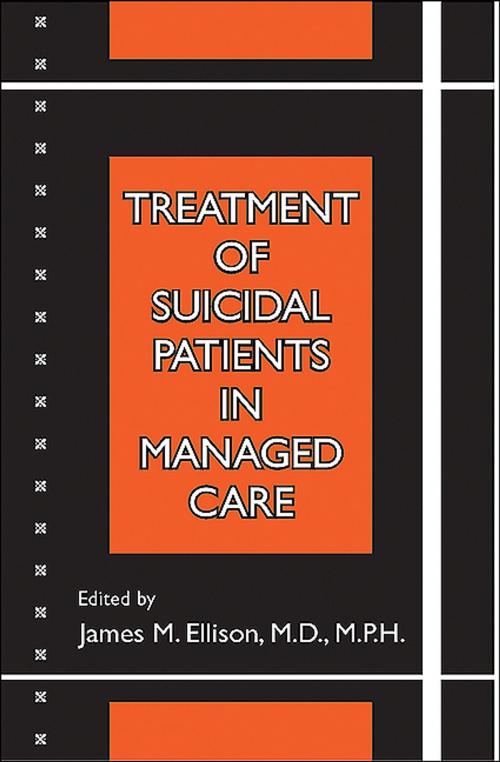Treatment of Suicidal Patients in Managed Care
Nonfiction, Health & Well Being, Medical, Specialties, Psychiatry| Author: | ISBN: | 9781585627912 | |
| Publisher: | American Psychiatric Publishing | Publication: | August 13, 2008 |
| Imprint: | American Psychiatric Association Publishing | Language: | English |
| Author: | |
| ISBN: | 9781585627912 |
| Publisher: | American Psychiatric Publishing |
| Publication: | August 13, 2008 |
| Imprint: | American Psychiatric Association Publishing |
| Language: | English |
Suicide remains all too common in the United States. As the ninth leading cause of death -- responsible for 30,000 deaths annually -- it is also one of the more preventable causes of death
Increasingly, mental health clinicians must care for suicidal patients within managed care systems. Managed care's cost-driven focus on rapid assessment and triage, narrowly restrictive hospital admission criteria, and abbreviated inpatient stays have resulted in poorer clinical care and increased opportunities both for adverse outcomes such as suicide and for clinician liability.
Bringing together a unique mix of clinicians, authorities, and administrators from private practice and managed care, Treatment of Suicidal Patients in Managed Care offers practical guidance on how to improve care and reduce risk for suicidal patients. Contributors explore a wide range of topics: Hospitalization -- Emphasizes the increased importance of the initial assessment when managed care systems shorten or deny hospitalization for suicidal patients and of knowing whom to call within the managed care system. Includes alternative programs from acute residential care to cognitive-behavioral strategies and dialectical behavior therapy for the suicidal patient in crisis Suicide risk among adolescents and the elderly -- For adolescents, emphasizes the value of multiple levels of care when admissions are too short and too often followed by distressing and costly readmissions. For the elderly, offers preventive interventions for primary care physicians who are uncomfortable discussing depression and suicidal ideation and intention with their elderly patients Suicide and substance abuse -- Details the role of case managers in providing continuity of care in a disorder known to be chronic and relapsing Pharmacotherapy of depression and suicidality -- Discusses the effects of managed care and raises questions about the expertise of the prescriber, especially relevant now that more primary care physicians are treating patients with uncomplicated unipolar depression Risk management issues -- To counter the perception that managed care companies profit from withholding care, emphasizes the crucial importance today of documenting the reasons for treatment decisions Helping those affected by the aftermath of a suicide -- A step-by-step process: 1) anticipating a suicide, 2) announcing or sharing the news of a suicide, 3) assessing those affected by a suicide, and 4) seeing what can be learned from reviewing the patient's treatment
This clinical guide will aid understanding of clinical, administrative, and risk management issues relevant to the care of suicidal patients. Psychiatrists, psychologists, nurse clinical specialists, social workers, administrators, and primary care physicians will also rely on it as they cope with the mounting pressures of managed care while maintaining the quality of their care for these vulnerable and patients.
Suicide remains all too common in the United States. As the ninth leading cause of death -- responsible for 30,000 deaths annually -- it is also one of the more preventable causes of death
Increasingly, mental health clinicians must care for suicidal patients within managed care systems. Managed care's cost-driven focus on rapid assessment and triage, narrowly restrictive hospital admission criteria, and abbreviated inpatient stays have resulted in poorer clinical care and increased opportunities both for adverse outcomes such as suicide and for clinician liability.
Bringing together a unique mix of clinicians, authorities, and administrators from private practice and managed care, Treatment of Suicidal Patients in Managed Care offers practical guidance on how to improve care and reduce risk for suicidal patients. Contributors explore a wide range of topics: Hospitalization -- Emphasizes the increased importance of the initial assessment when managed care systems shorten or deny hospitalization for suicidal patients and of knowing whom to call within the managed care system. Includes alternative programs from acute residential care to cognitive-behavioral strategies and dialectical behavior therapy for the suicidal patient in crisis Suicide risk among adolescents and the elderly -- For adolescents, emphasizes the value of multiple levels of care when admissions are too short and too often followed by distressing and costly readmissions. For the elderly, offers preventive interventions for primary care physicians who are uncomfortable discussing depression and suicidal ideation and intention with their elderly patients Suicide and substance abuse -- Details the role of case managers in providing continuity of care in a disorder known to be chronic and relapsing Pharmacotherapy of depression and suicidality -- Discusses the effects of managed care and raises questions about the expertise of the prescriber, especially relevant now that more primary care physicians are treating patients with uncomplicated unipolar depression Risk management issues -- To counter the perception that managed care companies profit from withholding care, emphasizes the crucial importance today of documenting the reasons for treatment decisions Helping those affected by the aftermath of a suicide -- A step-by-step process: 1) anticipating a suicide, 2) announcing or sharing the news of a suicide, 3) assessing those affected by a suicide, and 4) seeing what can be learned from reviewing the patient's treatment
This clinical guide will aid understanding of clinical, administrative, and risk management issues relevant to the care of suicidal patients. Psychiatrists, psychologists, nurse clinical specialists, social workers, administrators, and primary care physicians will also rely on it as they cope with the mounting pressures of managed care while maintaining the quality of their care for these vulnerable and patients.















